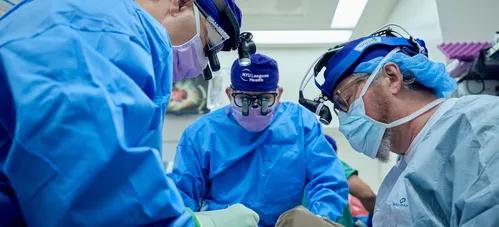New York: In a ray of hope for thousands of kidney transplant patients, surgeons at New York University Langone Transplant Institute have transplanted a genetically engineered pig kidney that continues to function well after 32 days in a man declared dead by neurologic criteria and maintained with a beating heart on ventilator support.
Advertisement
This represents the longest period that a gene-edited pig kidney has functioned in a human, and the latest step toward the advent of an alternate, sustainable supply of organs for transplant.
The procedure, performed on July 14, and led by Robert Montgomery, chair of the Department of Surgery, and director of the NYU Langone Transplant Institute, was the fifth xenotransplant performed at NYU Langone.
Observation is ongoing, and the study will continue through mid-September 2023, the university said in a statement.
"This work demonstrates a pig kidney - with only one genetic modification and without experimental medications or devices - can replace the function of a human kidney for at least 32 days without being rejected," said Dr Montgomery.
He had previously performed the world's first genetically modified pig kidney transplant into a human decedent on September 25, 2021, followed by a second similar procedure on November 22, 2021.
Surgeons with the Transplant Institute performed two genetically engineered pig heart transplants in summer 2022.
The first hurdle to overcome in xenotransplants is preventing so-called hyperacute rejection, which typically occurs just minutes after an animal organ is connected to the human circulatory system.
By "knocking out" the gene that encodes the biomolecule known as alpha-gal -- which has been identified as responsible for a rapid antibody-mediated rejection of pig organs by humans -- immediate rejection has been avoided in all five xenotransplants at NYU Langone.
To ensure the body's kidney function was sustained solely by the pig kidney, both of the transplant recipient's native kidneys were surgically removed.
One pig kidney was then transplanted and started producing urine immediately without any signs of hyperacute rejection, said the university.
During the observation phase, intensive care clinical staff maintained the decedent on support while the pig kidney's performance was monitored and sampled with weekly biopsies.
Levels of creatinine, a bodily waste product found in the blood and an indicator of kidney function, were in the optimal range during the length of the study, and there was no evidence on biopsy of rejection.
While previous genetically engineered pig organ transplants have incorporated up to 10 genetic modifications, this latest study shows that a single-gene knockout pig kidney can still perform optimally for at least 32 days without rejection.
"We've now gathered more evidence to show that, at least in kidneys, just eliminating the gene that triggers a hyperacute rejection may be enough along with clinically approved immunosuppressive drugs to successfully manage the transplant in a human for optimal performance -- potentially in the long-term," said Dr Montgomery.
Monitoring of the pig kidney recipient will continue for another month with permission from the family, ethics committee approval, and continued support from United Therapeutics.
--IANS
Pig kidney continues to function in human body after 32 days, scientists rejoice
 T
TAug 17, 2023, 10:28 AM
